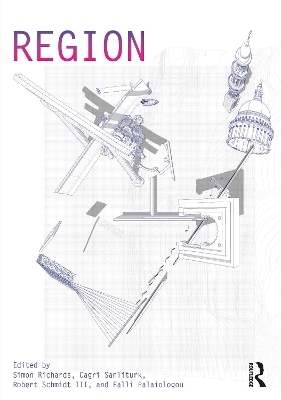
Region
Routledge (Verlag)
978-1-032-42257-2 (ISBN)
Curated into four key areas, the contributions from scholars around the world provide an essential volume for students, researchers and professionals.
This book explores how the concept of ‘region’ has evolved over time and shaped architectural culture and practice. It questions what the words ‘region’ and ‘regional’ mean for architecture, cities and landscapes past and present, and speculates on the forms they might take in the future. Region is explored in many thematic guises: as a real geographical site of evolving socio-economic activity; as a mythical locus of enduring value; as a gatekeeper of indigenous crafts and vernacular techniques; as a site of architectural and artistic imagination; as a repository of contested, conflicted and mobile identities. The contributing chapters take these themes from the theoretical and literary page through to architectural and urban practice, and from the scale of the domestic hearth through to the ocean archipelago and international law, enriching the long-standing trope of viewing architectural regionalism purely as a matter of style. Curated into four key thematic areas – Theorised Regions, Contested Regions, Heritage Regions and Future Regions – the book incorporates the values, concerns and approaches of a truly diverse international community of scholars, curators and practitioners, as well as the design work of international students tasked to explore what region means to them.
Simon Richards is a Senior Lecturer in Architectural History and Theory at Loughborough University. An art historian by training, his research and publications focus on the themes of comparative aesthetics, architectural tradition and heritage, as well as environmental psychology and philosophy. His previous books include Le Corbusier and the Concept of Self (Yale 2003) and Architect Knows Best: Environmental Determinism in Architecture Culture from 1956 to the Present (Ashgate 2016), and he is currently collaborating on a major project on Constantinos Doxiadis and the Delos Symposia. Robert Schmidt III is a Reader in Architectural Design at Loughborough University and leads the Adaptable Futures Group. His practice experience includes an extended period in New York with the prestigious and award-winning firm, Herb Beckhard and Frank Richlan (HB+FR), and he has received numerous plaudits for his design work including the Jeffrey J. Pilling Scholarship for Excellence in Design and the Pella Architectural Scholarship. Robert’s research focuses on the themes of adaptability and re-use, on which he has published several papers and books. Cagri Sanliturk is a Lecturer in Architecture and Politics at Loughborough University. His research and publications focus on the relation between theory and practice, seeking to understand architecture through the lenses of politics, performance art, visual art and narrative. He is particularly interested in exploring everyday life and spatial practices, often in situ with real communities, and in tracing how these relate to the controlling power within conflicted and divided societies. Garyfalia (Falli) Palaiologou is a Senior Lecturer in Urban Design at Loughborough University. Previously, she was Research Fellow at the UCL Bartlett School of Architecture at the Space Syntax Laboratory, funded by the Engineering and Physical Sciences Research Council (EPSRC). Falli’s research and publications concern the study of urban form through urban morphology and mapping methodologies, revealing the processes of urban change in a diverse range of settings from inner city residential typologies through to UNESCO heritage landscapes.
Part 1: THEORISED REGIONS 1. A ‘true organ of Humanity’: on the Anti-feminist Architectural Regionalism of Comtean Positivism in Victorian Britain 2. The Question Concerning Types: A Review 3. Four decades on three fronts: the unfinished projects of Critical Regionalism 4. On the Unique Intertwining of Region, Nature, and Architecture in Norway Part 2: CONTESTED REGIONS 5. On ‘Region’: Alterity and Regional Encounters in a Postcolonial Archipelago 6. The Azorean archipelago: the invention of a political region 7. Dismantling the Territorial Exclusions 8. Holding the Street: An Assemblage of Nicosia’s Borders 9. The implications of power on the status of women in society and its reciprocal relationship with the home space in Azerbaijan, Iran Part 3: HERITAGE REGIONS 10. How Wealth Kills Craft 11. Material Culture and Decolonisation: Post-Partition Lahore 12. Southwestern Fantasy: Pueblo Revival and regional authenticity in New Mexico 13. The Mediterranean: Between Vernacular and Contemporary. Tradition, Modernity and Tourism in the Architecture of Germán Rodríguez Arias Part 4: FUTURE REGIONS 14. The Case of Capri: Landscape, Regional Culture and Modern Architecture 15. Oscillating between cosmos and roots: the case of Geoffrey Bawa and his architecture 16. Designing for adaptability and sustainability in regional architecture: lessons from residences in North East Brazil 17. Infrastructural Peripheries in the City-Region: Airport Spatial Influences Part 5: REIMAGINING THE ARTEFACT The Infinity Porch. Mythical-ities: Spatial transcriptions of votive offerings dedicated to the Nymphs. A Wild Plant of Life. Forget-me-Not. Mis-reading. Wound-up. Waxed. Rotted. Yuanlin Region and Piranesi Region. Panam: The Lost City of Muslin. New Babylon. Resurrecting Architectural Ghosts [An Anticipation of Collective Memory]
| Erscheinungsdatum | 01.08.2023 |
|---|---|
| Reihe/Serie | Critiques |
| Zusatzinfo | 6 Tables, black and white; 22 Line drawings, black and white; 96 Halftones, black and white; 118 Illustrations, black and white |
| Verlagsort | London |
| Sprache | englisch |
| Maße | 174 x 246 mm |
| Gewicht | 1060 g |
| Themenwelt | Naturwissenschaften ► Biologie ► Ökologie / Naturschutz |
| Naturwissenschaften ► Geowissenschaften ► Geografie / Kartografie | |
| Technik ► Architektur | |
| ISBN-10 | 1-032-42257-2 / 1032422572 |
| ISBN-13 | 978-1-032-42257-2 / 9781032422572 |
| Zustand | Neuware |
| Informationen gemäß Produktsicherheitsverordnung (GPSR) | |
| Haben Sie eine Frage zum Produkt? |
aus dem Bereich


